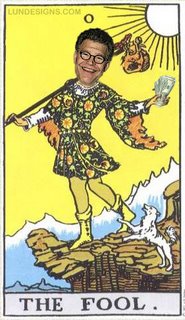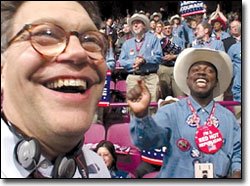Al Franken: God Spoke, SXSW Film Festival
GOD SPOKE?
New Film Could Shed Light On Franken's Motivations
Other than the obvious need to accumulate money and power (where he's not exactly alone in this world), what motivates Al Franken?
exactly alone in this world), what motivates Al Franken?
Given his transformation from alleged comic to key power broker in smoke-filled Democrat Party back rooms and political talk show host, what has sparked this top-to-bottom reinvention?
After many months covering Al Franken far more than we'd ever anticipated, the Radio Equalizer has a few thoughts:
--- Until he produced a book that largely focused on Rush Limbaugh's weight, Franken's comedic career was hardly strong, with failed television sitcoms and movies weighing down his resume. There's little doubt he felt the need to branch out into new arenas.
--- Through additional research insight, we've concluded Franken is an opportunist in the Arianna Huffington mold (you may recall she was a previously a "conservative"). Is Franken driven by core beliefs, or career advancement needs?
It's the latter, we now believe.
Before this radical leap, how much forethought went into Franken's career strategy? Did he create a blueprint, or has this been done on the fly?
 Attempts to answer these questions comes in a new film, Al Franken: God Spoke, directed by Nick Doob and Chris Hegedus. Debuting at Austin's South By Southwest Film Festival last Saturday, it's an apparently ambitious effort to once and for all try to figure out what's going on inside his head.
Attempts to answer these questions comes in a new film, Al Franken: God Spoke, directed by Nick Doob and Chris Hegedus. Debuting at Austin's South By Southwest Film Festival last Saturday, it's an apparently ambitious effort to once and for all try to figure out what's going on inside his head.
Because both admit upfront to Franken sympathies, the mixed view ultimately presented seems that much more credible.
Following Franken around for more than a year during 2003 and 2004, Doob and Hegedus had decent access, even if they were shut out from some shadowy political get-togethers. From Salon:
For conservatives, this seems to provide evidence Franken's stature within the Democrat Party is considerably higher than we might have previously believed. In the political realm, that creates an argument for taking Franken a bit more seriously.
Is Rush Limbaugh, with a vastly more successful media career, introducing presidential candidates to journalists or others in secret settings? Perhaps, but it isn't common knowledge if true.
Is Franken sure of what he's doing, or sometimes a bit lost? Also from the Salon review:
Here, the film's perspective is further explored:

While Variety's review is party-line (typical of Hollywood) sympathetic, it does add context:

Apparently not answered: why "progressives" feel Franken is so important, as opposed to other prominent names in their camp? In particular, why are they so defensive about his missteps?
More than anything, this film could help Franken's opponents gain insight into how best to confront him in the future. That alone would be worth the admission price, if Al Franken: God Spoke somehow manages to find national distribution.
Thanks for your continued and vital Radio Equalizer support, via Amazon orders that begin with clicks here, regardless of what you ultimately order!
Film image: Variety, Searching and Fool: David A Lunde for the Radio Equalizer, Baby Franken: Pete at Ihillary
New Film Could Shed Light On Franken's Motivations
Other than the obvious need to accumulate money and power (where he's not
 exactly alone in this world), what motivates Al Franken?
exactly alone in this world), what motivates Al Franken?Given his transformation from alleged comic to key power broker in smoke-filled Democrat Party back rooms and political talk show host, what has sparked this top-to-bottom reinvention?
After many months covering Al Franken far more than we'd ever anticipated, the Radio Equalizer has a few thoughts:
--- Until he produced a book that largely focused on Rush Limbaugh's weight, Franken's comedic career was hardly strong, with failed television sitcoms and movies weighing down his resume. There's little doubt he felt the need to branch out into new arenas.
--- Through additional research insight, we've concluded Franken is an opportunist in the Arianna Huffington mold (you may recall she was a previously a "conservative"). Is Franken driven by core beliefs, or career advancement needs?
It's the latter, we now believe.
Before this radical leap, how much forethought went into Franken's career strategy? Did he create a blueprint, or has this been done on the fly?
 Attempts to answer these questions comes in a new film, Al Franken: God Spoke, directed by Nick Doob and Chris Hegedus. Debuting at Austin's South By Southwest Film Festival last Saturday, it's an apparently ambitious effort to once and for all try to figure out what's going on inside his head.
Attempts to answer these questions comes in a new film, Al Franken: God Spoke, directed by Nick Doob and Chris Hegedus. Debuting at Austin's South By Southwest Film Festival last Saturday, it's an apparently ambitious effort to once and for all try to figure out what's going on inside his head.Because both admit upfront to Franken sympathies, the mixed view ultimately presented seems that much more credible.
Following Franken around for more than a year during 2003 and 2004, Doob and Hegedus had decent access, even if they were shut out from some shadowy political get-togethers. From Salon:
"Al didn't help us and he didn't hurt us," Doob says. "He did lots of events he never told us about," including hosting a private meeting at his New York apartment between John Kerry and several prominent journalists early in the campaign season, an exercise in insider power the filmmakers would obviously love to have captured. By the end of the film, in the grim aftermath of Bush's reelection, Franken begins to seriously explore a campaign against Sen. Norm Coleman, R-Minn., in 2008. As he tells an enthusiastic St. Paul audience, he'll be "the only New York Jew in the race."
For conservatives, this seems to provide evidence Franken's stature within the Democrat Party is considerably higher than we might have previously believed. In the political realm, that creates an argument for taking Franken a bit more seriously.
Is Rush Limbaugh, with a vastly more successful media career, introducing presidential candidates to journalists or others in secret settings? Perhaps, but it isn't common knowledge if true.
Is Franken sure of what he's doing, or sometimes a bit lost? Also from the Salon review:
One thing the Election Day scenes clearly establish is that Doob and Hegedus haven't made a Franken infomercial, but rather a portrait of a complicated and enigmatic guy who is making a rapid and sometimes awkward transition from entertainer to political commentator and finally to potential candidate.
Franken allowed the filmmakers to follow him around whenever they could, but he had no control over any aspect of their work, and the movie is in no way a collaboration. He seems both profoundly committed to his cause and at the same time a pool-hall hustler working all the angles: He chats affectionately with Karen Hughes, and performs his Henry Kissinger impersonation for an appreciative Henry Kissinger.
Here, the film's perspective is further explored:

There's certainly material in the film that Franken's opponents -- Bill O'Reilly, for one, seems bizarrely obsessed with him -- can pull out to make him look bad. In a television debate with Ann Coulter about the semi-notorious 2002 memorial service for the late Sen. Paul Wellstone, for instance, Franken is preoccupied by relatively minor details: Was Sen. Trent Lott actually booed? Was he ever actually onstage?
He never adequately challenges the big-picture smear, in which the event was depicted by right-wing media as a partisan hatefest rather than a spirited farewell to one of the American left's few office-holding heroes.
"We try to make Al a human being, not a cardboard hero," says Hegedus. "I think he loses that debate with Ann Coulter. But you know, I tend to make films about people I'm fundamentally sympathetic to, even if it's in a bizarre way, like with my film about John DeLorean ['DeLorean,' 1981]. When we started this project, we didn't know that much about Al. But when we went on his book tour [for 'Lies and the Lying Liars Who Tell Them'], he was drawing such huge crowds, and they were so hungry for the message he was bringing them.
While Variety's review is party-line (typical of Hollywood) sympathetic, it does add context:

Before large audiences and in small groups, Franken speaks much like he writes, with equal measures of barbed irreverence, snarky ridicule and, occasionally, passionate outrage. (Describing Air America to potential advisers, he rails against right-wing talkradio's "simplistic black-and-white babble about the way the world works.")
With more mischievousness than modesty, he insists that, while dealing with the likes of Coulter and O'Reilly, he isn't really a satirist at all. Rather, he claims, "I take what they say and use it against them. What I do is jujitsu. They say something ridiculous, and I subject them to scorn and ridicule. That's my job."
Franken's apparently very good at that job, judging from the frequent clips of O'Reilly's apoplectic on-air comments about his bete noire. Not surprisingly, pic frames Franken as the clear-cut victor in every duel of wits with outmatched opponents (including Sean Hannity and Michael Medved).
In stark contrast, he appears amusingly amateurish during his on-the-job training prior to Air America's debut.
Apparently not answered: why "progressives" feel Franken is so important, as opposed to other prominent names in their camp? In particular, why are they so defensive about his missteps?
More than anything, this film could help Franken's opponents gain insight into how best to confront him in the future. That alone would be worth the admission price, if Al Franken: God Spoke somehow manages to find national distribution.
Thanks for your continued and vital Radio Equalizer support, via Amazon orders that begin with clicks here, regardless of what you ultimately order!
Film image: Variety, Searching and Fool: David A Lunde for the Radio Equalizer, Baby Franken: Pete at Ihillary



4 Comments:
Of course Brian provides the "fall of Air America" without any context - ie, the fall of talk radio IN GENERAL.
Case and point: WBAL Radio cancels Rush Limbaugh
"According to Arbitron, which rates radio stations, Limbaugh's audience share on WBAL dropped 27 percent last fall compared to fall 2004."
Wow, 27% - coincidentally also Limbaugh's blood/oxicontin percentage.
By Nate, at 14 March, 2006 03:58
Nate, at 14 March, 2006 03:58
Yeah, I noticed that too. He should turn some of that investigative reporting into finding out what happened to his pronunciation of the letter "s".
By Adam Berkowitz, at 14 March, 2006 15:48
Adam Berkowitz, at 14 March, 2006 15:48
Does Brian really have a lisp? Does anyone have a recording of him?
Thanks.
By Berkeley_Guy, at 14 March, 2006 17:18
Berkeley_Guy, at 14 March, 2006 17:18
Apparently not answered: why "progressives" feel Franken is so important, as opposed to other prominent names in their camp? In particular, why are they so defensive about his missteps?
The best example of projection I have seen this week.
By @whut, at 15 March, 2006 02:52
@whut, at 15 March, 2006 02:52
Post a Comment
<< Home